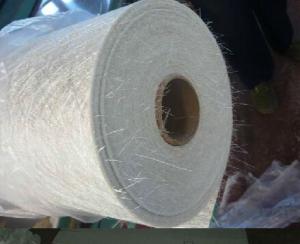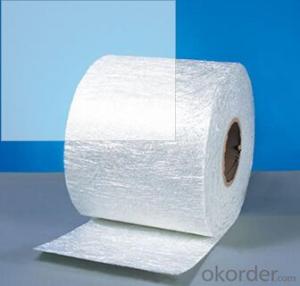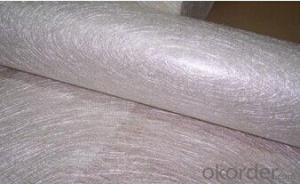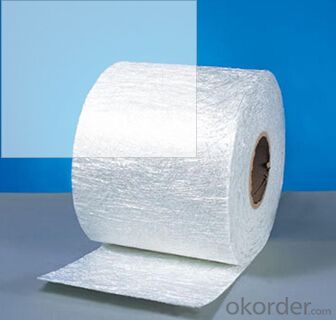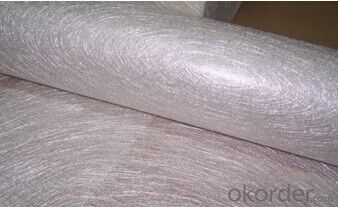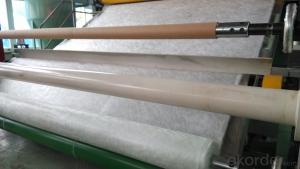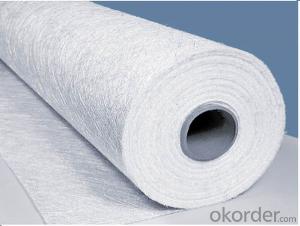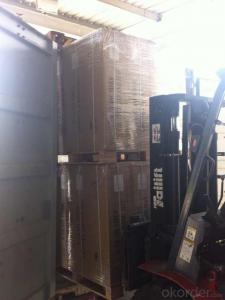Fiberglass Mat Tissue C-Glass Chopped Strand Mat-Emulsion
- Loading Port:
- China Main Port
- Payment Terms:
- TT or LC
- Min Order Qty:
- -
- Supply Capability:
- -
OKorder Service Pledge
OKorder Financial Service
You Might Also Like
Introduction of E-glass Chopped Strand Mat
Chopped strand mat is made from fiberglass chopped strands boned with powder binder or emulsion binder.
E glass chopped strand mat is made from fiberglass strands chopped to length and bonded together
with powder binder. Chopped strand mat is used primarily for hand lay-up processes, filament winding and press molding of FRP products. Typical products include bathroom
E glass chopped strand mat is made from fiberglass strands chopped to length and bonded together
with powder binder. Chopped strand mat is used primarily for hand lay-up processes, filament winding and press molding of FRP products. Typical products include bathroom
accessories, pipe, building materials, automobiles, furniture and other FRP products.
Features of E-glass Chopped Strand Mat
1.Warp and weft rovings aligned in a parallel,flat manner and uniform tension .
2.Densely alighed fibers,providing high dimensional stability ans easy handing .
3.Good moldability,fast and complete resin wet-out ,enabling high productively .
4.Good transporsision and hign strength of the composite products.
5.Even thickness ,no fuzz ,no stain.
6.Fast wet-out ,products with high strength ,little loss for strength in damp situation.
7.fiberglass woven roving has the features of : high tensile strength, corrosion resistance, flame retardance,insulativity.main function
8.applied to hand lay-up process
9.to reinforce UP resin
10.even thickness and flawless
11.good performance of processability in moulded parts
12.properties guaranteed under moisture condition
13.excellent mechanical strength during production of finished products
Features of E-glass Chopped Strand Mat
1.the composit products have high dry and wet tensile strenth and good transparency.
2.Low fuzz ,dirt ,impurity and other stain
Images of E-glass Chopped Strand Mat
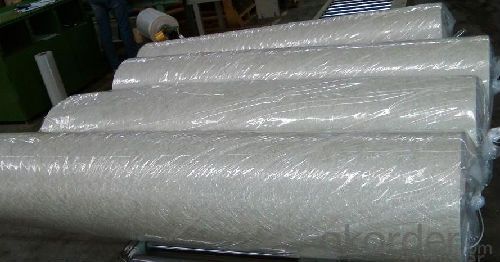
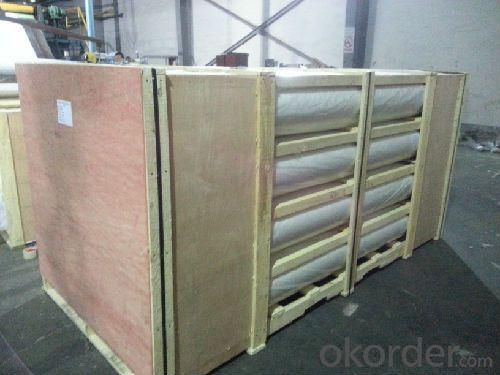
E-Glass Chopped Strand Mat Specification:
Property | Glass type | Weight(g/m2) | Width 200~3300 | Roll Weight | Moisture Content /% | Combustible Content /% | Breakage Strength /N |
Test Method | GB/T 1549 | ISO3374:2000 | ISO3374 | GB/T17470-1998 | ISO3344:1997 | ISO1887:1995 | ISO3342 |
EMC 80 | E-GLASS | 80±16 | ±5 | 6~50 | <0.2 | 13.6±0.35 | ≥200 |
EMC 100 | E-GLASS | 100±10 | ±5 | 6~65 | <0.2 | 9.5±0.35 | ≥170 |
EMC 150 | E-GLASS | 150±15 | ±5 | 6~97 | <0.2 | 8.0±0.35 | ≥40 |
EMC 225 | E-GLASS | 225±22 | ±5 | 6~150 | <0.2 | 5.0±0.6 | ≥60 |
EMC 300 | E-GLASS | 300±30 | ±5 | 6~180 | <0.2 | 4.0±0.6 | ≥90 |
EMC 450 | E-GLASS | 450±45 | ±5 | 6~180 | <0.2 | 3.8±0.6 | ≥120 |
EMC 600 | E-GLASS | 600±60 | ±5 | 6~240 | <0.2 | 3.6±0.6 | ≥150 |
EMC 900 | E-GLASS | 900±90 | ±5 | 6~190 | <0.2 | 3.4±0.6 | ≥180 |
FAQ of Chopped strand mat
1. Why Choose us?
CNBM is a stated own company, provide the guarantee for the best quality, best service and safety business.
2. How will we guarantee the quality?
a, ISO 9001-2008 quality control system;
b, Strict and regular quality control in production;
c, Inspeciation when loading into container before shippment;
d, Sample stock for one year for quality tracing and record.
3. What is your MOQ?
Our MOQ is one pallet.
4. Can you provide sample?
Yes, samples are in stock. we can offer free sample for you.
5. Payment terms?
We can accept L/C, T/T etc.
6. Do you offer OEM service?
Yes, we can print customers’ logo on the packaging;
And the size and specification can be produced and design according to your demand.
7. What is the Production Lead Time?
1 *40HQ each day.
- Q: Is fiberglass mat tissue suitable for wind energy applications?
- Yes, fiberglass mat tissue is suitable for wind energy applications. Fiberglass mat tissue is a lightweight and durable material that is commonly used in the construction of wind turbine blades. It provides excellent strength and stiffness, making it ideal for withstanding the high stresses and forces that wind turbines are subjected to. Additionally, fiberglass mat tissue is resistant to corrosion and degradation from UV radiation, ensuring the longevity and performance of wind turbine blades. Overall, the use of fiberglass mat tissue in wind energy applications allows for the production of efficient and reliable wind turbines that can generate clean and sustainable energy.
- Q: How long does fiberglass mat tissue typically last?
- The lifespan of fiberglass mat tissue can vary depending on various factors such as the quality of the material, its exposure to environmental conditions, and the level of maintenance. On average, fiberglass mat tissue can last anywhere from 20 to 30 years. However, with proper installation and regular upkeep, it is possible for it to last even longer. It is important to note that regular inspection and maintenance can help identify any signs of wear or damage, allowing for timely repairs or replacements to ensure its longevity.
- Q: What are the different thickness tolerances for fiberglass mat tissue?
- The thickness tolerances for fiberglass mat tissue can differ depending on the manufacturer and product specifications. Generally, fiberglass mat tissue is offered in a range of thickness tolerances from 0.5 millimeters (mm) to 3 mm. The tolerance represents the acceptable range of thickness variation within a product. For instance, a fiberglass mat tissue with a thickness tolerance of +/- 0.5 mm means that the actual thickness can deviate by up to 0.5 mm in either direction from the specified thickness. The required tolerance for a specific application depends on the intended use and desired precision. Thicker fiberglass mat tissues with smaller tolerances are commonly utilized in applications that demand greater strength and durability, like reinforcing concrete in the construction industry or manufacturing composite materials. Conversely, thinner fiberglass mat tissues with larger tolerances may be employed in applications where flexibility and conformability take precedence, such as insulation or soundproofing in the automotive industry. To obtain accurate information regarding available thickness tolerances for fiberglass mat tissue, it is crucial to refer to the manufacturer's specifications or contact a supplier. These tolerances can significantly vary based on the specific product and supplier.
- Q: Can fiberglass mat tissue be used for composite tooling?
- Composite tooling can utilize fiberglass mat tissue, a lightweight material formed from randomly arranged strands of fiberglass that are bonded together with a resin binder. This material is commonly employed in composite applications like boat construction, automotive components, and aerospace structures, serving as a reinforcement material. Utilizing fiberglass mat tissue for composite tooling can bring about increased strength and stiffness to the structure of the tooling. By layering and impregnating the mat tissue with resin, a sturdy and long-lasting composite tool can be formed. The resin binder in the mat tissue aids in holding the fibers together and offering resistance against wear and tear. Additionally, fiberglass mat tissue is malleable and easily molded into intricate shapes, making it suitable for crafting tooling with complex designs. It can be effortlessly cut and shaped to match the desired dimensions of the tooling. Nevertheless, it is crucial to acknowledge that fiberglass mat tissue alone might not meet the requirements of all tooling applications. Depending on the specific demands of the tool, additional reinforcement materials like carbon fiber or Kevlar may be necessary to augment strength and durability. To summarize, fiberglass mat tissue presents a cost-effective and practical option for composite tooling, bestowing strength, flexibility, and user-friendliness.
- Q: How does the surface finish of fiberglass mat tissue affect its adhesion to resin?
- The adhesion of resin to fiberglass mat tissue can be significantly influenced by its surface finish. The surface finish pertains to the texture or smoothness of the fiberglass mat tissue. In general, a rough surface finish tends to promote better adhesion to resin. This is because a rough surface provides a larger area for the resin to adhere to, resulting in a stronger bond. Rough surface finishes can be achieved through different manufacturing techniques, such as using coarser fibers or incorporating texturizing agents during production. On the contrary, a smoother surface finish may lead to weaker adhesion. A smooth surface does not offer as much area for the resin to bond with, resulting in a weaker and less durable bond. Smoother surface finishes can be attained by using finer fibers or through additional processing steps to smoothen the surface. When selecting the surface finish of fiberglass mat tissue, it is crucial to consider the specific application and requirements. For applications that necessitate high strength and durability, a rougher surface finish may be preferable to ensure optimal adhesion to the resin. Conversely, for applications where a weaker bond is acceptable or where a smoother surface finish is desired for aesthetic reasons, a smoother surface finish may be chosen. Ultimately, the surface finish of fiberglass mat tissue plays a vital role in determining the adhesion to resin. It is essential to choose the appropriate surface finish to achieve the desired strength, durability, and performance in various applications.
- Q: Can fiberglass mat tissue be used for wind turbine blades?
- Yes, fiberglass mat tissue can be used for wind turbine blades. It is commonly used as a reinforcement material in wind turbine blade manufacturing due to its high strength, lightweight nature, and excellent corrosion resistance.
- Q: Can fiberglass mat tissue be used for making surfboards?
- Yes, fiberglass mat tissue can be used for making surfboards. It is a common material used in the construction of surfboards due to its strength, durability, and ability to provide the necessary stiffness and flexibility required for optimal performance in the water.
- Q: How does fiberglass mat tissue compare to fiberglass insulation batts?
- Fiberglass mat tissue and fiberglass insulation batts serve different purposes and have distinct characteristics. Fiberglass mat tissue is primarily used as a reinforcement material in various applications such as roofing, wall coverings, and composite materials. It provides strength, durability, and improved dimensional stability to the finished product. On the other hand, fiberglass insulation batts are specifically designed for thermal insulation purposes, typically used in walls, ceilings, and attics to prevent heat transfer. They are engineered to trap air pockets within the material, providing excellent thermal resistance. While both products are made from fiberglass and offer certain insulation properties, their specific applications and performance differ significantly.
- Q: Is fiberglass mat tissue resistant to corrosion?
- Indeed, corrosion is not a concern for fiberglass mat tissue as it is comprised of non-metallic elements like glass fibers, unlike metals which are susceptible to rust and corrosion. This quality renders fiberglass mat tissue highly suitable for various purposes that demand resistance against corrosion, such as reinforcing concrete structures within the construction sector or for boat building in the marine industry. Furthermore, fiberglass mat tissue exhibits resistance towards chemicals, moisture, UV rays, and extreme temperatures, thereby augmenting its strength and longevity.
- Q: What is the lifespan of fiberglass mat tissue?
- The lifespan of fiberglass mat tissue can vary depending on various factors such as the quality of the material, the conditions it is exposed to, and the level of maintenance it receives. However, fiberglass mat tissue is generally known for its durability and long lifespan. With proper installation and regular maintenance, fiberglass mat tissue can last for many decades. It is resistant to corrosion, moisture, and UV radiation, which helps to prolong its lifespan. Additionally, fiberglass mat tissue is often used in applications such as roofing, insulation, and reinforcement, where it is designed to withstand harsh conditions and provide long-term performance.
Send your message to us
Fiberglass Mat Tissue C-Glass Chopped Strand Mat-Emulsion
- Loading Port:
- China Main Port
- Payment Terms:
- TT or LC
- Min Order Qty:
- -
- Supply Capability:
- -
OKorder Service Pledge
OKorder Financial Service
Similar products
Hot products
Hot Searches
Related keywords
